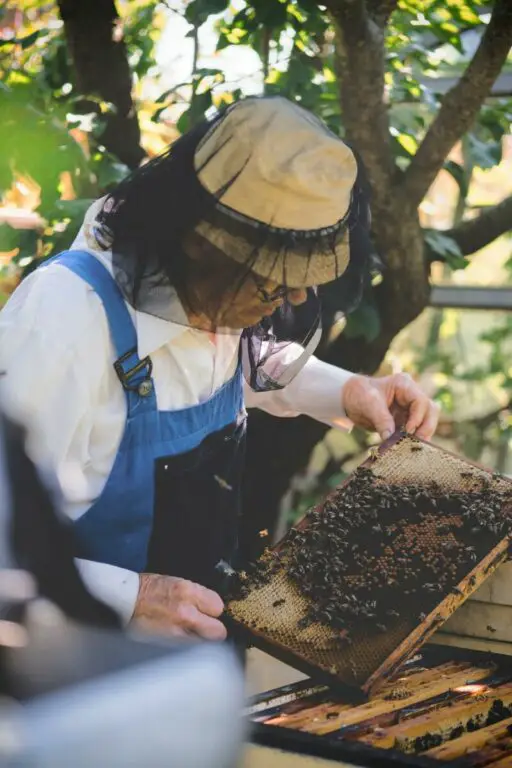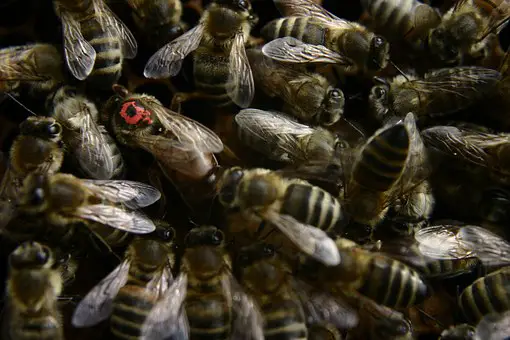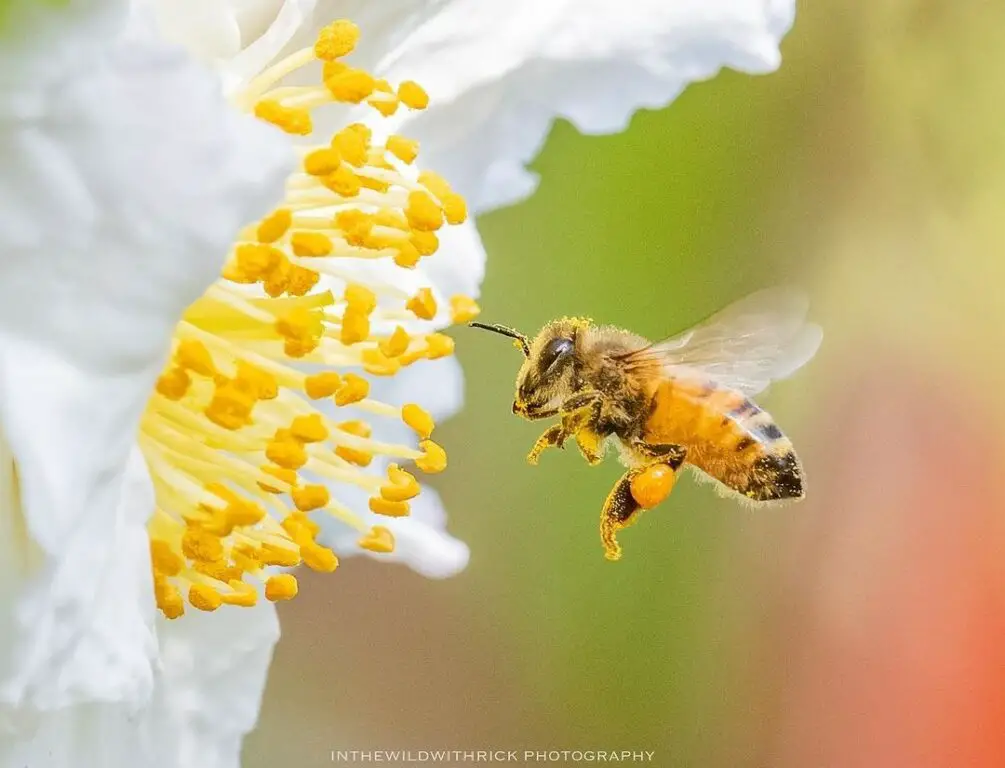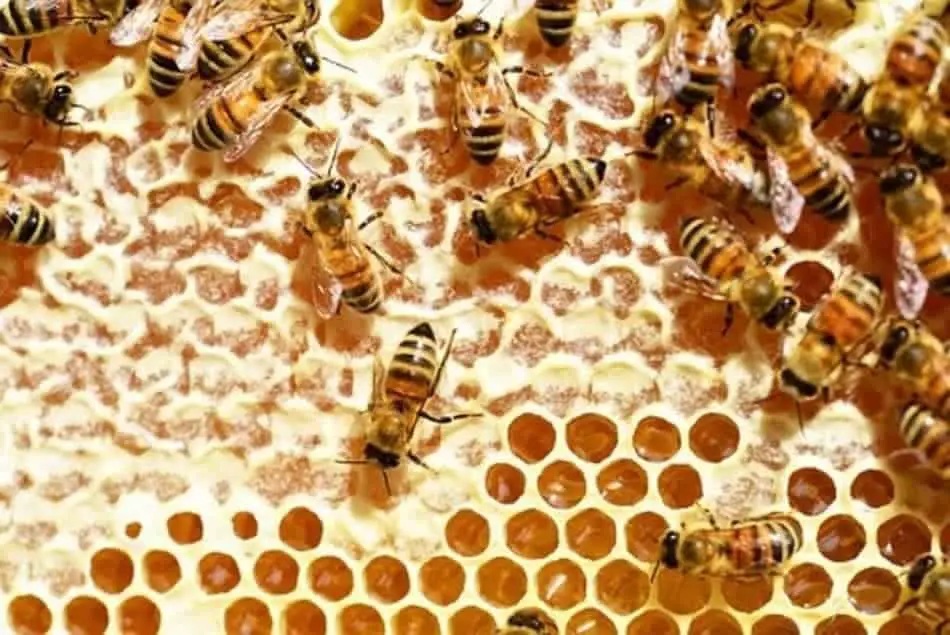This post contains affiliate links.
Are you buzzing with curiosity about whether the world of beekeeping is meant for you? It’s a wonderfully rewarding hobby, rich with sweet perks and the satisfaction of fostering these vital pollinators. But not everyone is cut out to be a beekeeper.
My article is designed to help you identify the key signs that you’re ready to don the suit and step into the apiary. So, let’s dive into the hive and explore if you have what it takes to embark on this sticky, but oh-so-sweet adventure.
Is Beekeeping Right for You: Gauging Your Aptitude for Bee Care
If you’re humming with curiosity about whether beekeeping is right for you, understanding your aptitude for this unique hobby is a key first step. One of the best ways to tell if beekeeping is a fit for your lifestyle and interests is to consider your reaction to the creatures at the heart of it all: the bees. If you find yourself fascinated by bees, captivated by their social structure, and aren’t averse to the occasional sting, these are good signs that you’re on the right path.
When you think about bees, if you see them as peaceful cohabitors of your garden rather than pests, it’s a sign that you’re ready to start a journey into beekeeping. The practice requires patience, as well as a propensity to continuously learn and adapt to the needs of your buzzing companions. If you’re naturally patient and don’t mind waiting to see the fruits of your labor, beekeeping could indeed be right for you.
One must contemplate if you have the time and resources to commit. Good beekeepers know that bees require consistent care, and neglect isn’t an option. When you ponder taking up this hobby, if you can envision dedicating afternoons to inspecting hives, harvesting honey, and ensuring the health of your bee colony, you’re considering what it truly means to be a beekeeper.
Additionally, if environmental stewardship gets your heart buzzing, then you’ll find beekeeping to be an immensely fulfilling practice. Bees play a vital role in our ecosystem as pollinators, and if you’re keen on contributing to their preservation, then beekeeping is a noble pursuit.
It’s also important to gauge your level of comfort around bees. If you’re able to remain calm when a bee lands on your arm and not flinch, this equanimity is invaluable as a beekeeper.
I recommend all new beekeepers wear full protective beekeeping gear and only gradually abandon that gear by individual pieces as they become more comfortable around the bees.
Bees naturally attack the face and eyes of anything they perceive as a predator, so the veil would be the last piece of gear to abandon, and maybe never.
Finally, if you’re someone who enjoys community involvement, beekeeping can offer that in spades. Many beekeepers form local cooperatives or join beekeeping associations, sharing knowledge and resources. When you start to see this as exciting rather than daunting, it suggests that you’re ready to embrace the communal aspect of beekeeping.
In essence, to see if you’re suited for the beekeeper’s life, you must honestly assess your interest in and commitment to the welfare of bees. If you’re eager to start this journey and equipped with dedication and a love for nature, then these are clear indicators that beekeeping is right for you, and you may just have found yourself a rewarding new passion.

Related Articles:
- The Beginner’s Guide to Backyard Beekeeping: A Beginners Guide & Tips for the Aspiring Backyard Beekeeper
- Why Beekeeping is Important for the Environment: Essential Benefits of Bees to Biodiversity
- 5 Essential Benefits of Starting Beekeeping: Best Reason to Start Backyard Beekeeping for Beekeepers
- The History of Beekeeping: A Fascinating Journey for Bees and Beekeepers
- Understanding the Role of Bees in Our Ecosystem: Importance of Bees in the Environment
- Essential Equipment for Starting Your Hive: Beekeeping Tools & Gear | Beekeeping Equipment for Beginners
- Common Myths About Beekeeping Debunked: Beekeepers Expose Misconceptions & Bee Myths
- Understanding Bee Behavior: What New Beekeepers Must Know – Learn Honeybees and Beekeeping
Understanding Honey Bees and Their Queen: The Heart of the Colony
Diving into the world of beekeeping, it’s essential to have a profound respect and understanding of honey bees and the pivotal role the queen bee plays within the colony. These remarkable insects are more than just producers of the golden nectar; they are a sophisticated society with intricate behaviors and a social hierarchy that is fascinating to observe. If you’re considering whether the path of the beekeeper is the one for you, start by immersing yourself into the life of honey bees; a journey that’s both rewarding and enlightening.
The queen bee is the linchpin of the colony, responsible not just for laying eggs, but for using her pheromones to effectively govern the colony’s dynamics. A healthy, vigorous queen lays thousands of eggs and is the mother to all the bees within her domain.
Her presence and health dramatically influence the vitality and stability of the colony, making her well-being a beekeeper’s top priority. Should you find yourself invested in learning about and caring for the queen, ensuring she thrives and in turn, witnessing the colony flourish, then beekeeping might just be your calling.

It makes it easy to identify her and marks the year she was
introduced to the hive.
| Color | Year Ending In: |
| Yellow | 2 or 7 |
| Red | 3 or 8 |
| Green | 4 or 9 |
| Blue | 5 or 0 |
A strong connection to the colony’s ebb and flow is central to managing honey bees with skill. The dedication to observing bees closely, learning their patterns and communication, and noticing when there’s a shift in their activity can be indications of a natural beekeeper’s intuition.
Embracing the whisper of the bees, understanding their needs, and reacting with knowledge and empathy, is what transforms a hobbyist into a steward of these pollinators. Your patience and commitment will be tested throughout the journey, but the rewards of supporting these vital creatures are boundless.
Connecting with a community of fellow bee enthusiasts can also enhance your understanding of honey bees. Engaging in group discussions, sharing insights, and solving challenges together emboldens your knowledge and readiness. If you’re eager to absorb every tidbit about honey bees, from their seasonal behaviors to the nuances of queen rearing, you’re likely to find a hive of satisfaction in beekeeping. Remember, a contented hum from a thriving colony is a sweet sign of success.
I have been a member of a beekeeping association for many years and have learned much just by reading the forum, where many beekeepers, from novices to experts, ask questions and receive answers.
I have also attended many lectures by Randy Oliver, a nationally renowned bee scientist.
He offers free advice and shares scientific data regarding his research on his website, ScientificBeekeeping.com.
After all, beekeeping is much more than a pastime; it’s a stewardship, a blend of art and science that demands a heart for conservation and a willingness to learn continually. If you find yourself drawn to the dance of the bees around their queen, captivated by the complexity of the colony, and ready to commit to the bees, then, my fellow enthusiast, beekeeping might be just the endeavor for you.
Nurturing these small yet significant creatures is not only about the precious honey they provide but also about preserving and respecting the environment we share. When you see the bees and their queen not merely as bees but as tiny engineers of the natural world, you’ve caught the true essence of what it means to be a good beekeeper.
Here is a list of the types of honeybees you will find in your hive,
and what importance they are to the hive:
- Queen Bee:
- Lays all the eggs in the hive
- Releases pheromones to regulate hive behavior
- Drone Bees (male):
- Mating with the queen is their primary role
- Do not have a stinger and do not participate in pollination or nectar collection
- Worker Bees (female):
- Days 1-2: Clean the hive and keep the brood warm.
- Days 3-5: Feed older larvae with bee bread—a mixture of honey and pollen.
- Days 6-11: Feed the youngest larvae with royal jelly.
- Days 12-17: Produce beeswax, build honeycomb, and transport food.
- Days 18-21: Guard the entrance, inspect incoming bees for threats like parasites or robbers.
- Days 22-end of life: Forage for nectar, water, pollen, and propolis.
When to Consider Beekeeping: Knowing What to Expect
Deciding when to start beekeeping may feel as thrilling as it is daunting, but understanding the journey ahead is essential. Perhaps you’ve felt the pull of this ancient craft, found yourself mesmerized by the harmony within a beehive, or just yearn for a tangible connection to nature. If that’s you, it’s quite possible beekeeping could suit you to a tee.
It’s not just about donning a suit and harvesting honey; it involves a deep commitment and an eagerness to learn. When you find yourself eager to peek inside the beehive, to ensure its health and productivity, it’s a sign that beekeeping has piqued your interest.
Beekeeping isn’t a pursuit to jump into without forethought; one must assess if the time is right. If you’re pondering beekeeping, you need to be ready for the learning curve. It’s imperative to have an understanding of the bees, their life cycles, and the influence of seasons on their behavior. If you’re constantly engaging with beekeeping literature, joining local beekeeping clubs, or just downright fascinated by these marvelous insects, then you’re probably heading in the right direction.
Assuming that you’ve decided beekeeping is for you, remember it’s a practice defined by seasons. When spring unfolds, it’s a prime time to start a new hive, as flowers bloom and bees begin their tireless forage. This season is pivotal for aspiring beekeepers to get their bees settled into their new home.
Proper timing can truly make a difference in the success of your colony. When you’re aware and prepared for the cycle of bee life and how that interacts with beekeeping tasks, you’re showing signs of a good beekeeper.
With passion and patience, you might just discover that beekeeping is an extraordinarily rewarding pursuit. When the bees buzz harmoniously in their abode, and you’ve surmounted the initial hurdles, the satisfaction is immeasurable.
The sound of content honeybees during a hive inspection.
However, if you’re expecting immediate results, remember that beekeeping often requires a steady, nurturing hand. Whether it’s installing the queen bee, inspecting the hive, or managing pests, each action you take must be done with deliberation and care. The true heart of the colony, the queen bee, requires your utmost attention, ensuring she thrives for the colony to prosper.
Ultimately, if thoughts of bees occupy your mind, if you find yourself anticipating the fascinating world contained within a beehive, or if you’re simply keen on contributing to the well-being of these crucial pollinators, it’s likely that beekeeping is calling to you. You may just possess the innate curiosity, diligence, and respect for nature that marks a truly magnificent beekeeper.
Top 7 things to consider before becoming a backyard beekeeper:
- Variability of Honey Yield: Many new beekeepers may not realize that honey production can significantly vary each year due to factors such as weather, forage availability, and the health of the colony.
- Time Commitment: The amount of time required to maintain healthy bee colonies often surprises new beekeepers, with regular checks, pest management, and harvesting all being more time-consuming than anticipated.
- Bee Behavior: Understanding and predicting bee behavior can be challenging. Factors such as swarming instincts and aggressive tendencies may catch new beekeepers off guard.
- Local Zoning Laws: Unbeknownst to many beginners, local regulations may have specific requirements or restrictions related to beekeeping, affecting hive placement and operation.
- Pest and Disease Management: The constant threat of pests like varroa mites and diseases such as American foulbrood can take new beekeepers by surprise, requiring vigilant monitoring and management strategies.
- Queen Bee Dynamics: The critical role of the queen and the complexities involved in her health, replacement, or the introduction of a new queen to the hive often comes as an unexpected aspect of colony management.
- Equipment Costs and Maintenance: Finally, new beekeepers might not anticipate the initial investment for beekeeping equipment and the ongoing costs for maintenance and replacement of gear over time.
Good beekeepers maintain a balance between intervention and allowing the bees to exercise their natural behaviors. It’s those beekeepers who find wonder in the bees’ world and acknowledge that we’re just guests, learning and benefiting from their existence.
Moving beyond just considering beekeeping and into the realm of practice requires a blend of knowledge, patience, and a genuine love for bees. Knowing what to expect, embracing the good times and the challenges, positions you among the ranks of good beekeepers
If you’re contemplating whether beekeeping is right for you, gauge your aptitude not just by your ability to produce honey, but by your enthusiasm to become part of a bee’s life. Even if just starting out, your journey could contribute to the good in beekeeping, which indeed, is about so much more than just honey production.

Embarking on the journey of beekeeping is undeniably thrilling, but how can we truly determine whether we’re cut out to be guardians of these vital pollinators? It all starts with understanding the essential traits and skills necessary to be a good beekeeper.
If you’re someone who marvels at the symbiosis of nature and possesses a steady hand for the delicate work of hive management, then you’re on the right track.
The calling to beekeeping often comes to those who find solace in the buzz of the garden, where hard work meets the gentle hum of bees. Should you repeatedly find yourself gravitating towards literature about these fascinating creatures or constantly checking on the well-being of pollinators in your garden, these are good signs that beekeeping might just be your calling.
Patience is another linchpin in how to be a good beekeeper. The meticulous care needed to manage a beehive isn’t accomplished in a hurry. You’ll need to check, and double-check, the health of your queen and her brood, observe the bees’ behaviors, and ensure the hive is free from pests; each task requiring an eye for detail and a calm demeanor.
Essential skills also include being proactive and responsive to the needs of the bees. If you find yourself planning, with great anticipation, the steps you’ll take through each season to support your hive, then you’re likely demonstrating the good foresight requisite for successful beekeeping.
To truly see if beekeeping is right for you, ask yourself if you possess a bold mix of curiosity and discipline. Curiosity drives us to learn and understand the complex lives of honey bees and their queen, the heart of the colony. Meanwhile, discipline ensures we adhere to the timely and sometimes rigorous requirements of bee care.
Furthermore, if you have a knack for problem-solving, you’ll be well-equipped to handle the unpredictable challenges that this journey may bring. To be a good beekeeper, one must bear in mind that beekeeping is more than just honey production; it’s a commitment to supporting the environment and the thriving of these incredible insects.
In essence, when you check yourself against these qualities and find a sense of fulfillment and eagerness to embrace the myriad tasks of beekeeping, then it’s very likely you are a good fit.
Beekeeping isn’t just a hobby; it’s a lifestyle that intertwines with the rhythms of nature and demands respect for the living systems we’re tending to. So, if you’re wondering whether the world of beekeeping is right for you, these traits and skills are the perfect frame of reference to see yourself in the light of a true beekeeper.
Managing Bee Stings and Minor Setbacks in Beekeeping
Beekeeping is an incredibly rewarding endeavor, but it’s not without its challenges. One common aspect of bee care that you’ll inevitably encounter is managing bee stings. It’s an integral part of being a beekeeper and, while most stings are a minor inconvenience, for someone with a bee sting allergy, the results can range from swelling and itching to full-on anaphylactic shock.
Understanding that bee stings are a natural defense mechanism for bees and not an act of aggression can help you maintain a calm disposition during these moments. Bee stings, although not pleasant, are a sign that your bees are vigilant and protective of their beloved queen and hive.
In my experience, if the bees are agitated or don’t want me around the hive, there will be some bees that “bump” me as a way of warning me to stay away. That bump is usually against my veil.
This is were the smoker becomes really important at calming the bees down.
As a dedicated beekeeper, you’ll learn how to handle bee stings with grace. Knowledge about how to treat bee stings promptly and effectively is crucial. For the most minor reactions, a simple remedy of ice and antihistamine can suffice. However, every beekeeper, especially those with known allergies, should have an emergency plan in place including access to an epinephrine injector if necessary.
It’s not just about the beekeeper’s welfare, though. It’s also about respecting the bees and learning from every interaction with them, which includes managing bee stings.
The ways I have found to decrease bee sting effects is to remove the stinger without breaking the stinger sac by scraping it out with a credit card, or my personal favorite, gently placing a piece of tape over the stinger and the tape pulls the stinger out without breaking the stinger sac.
Aside from bee stings, various minor setbacks in beekeeping can occur, such as issues with the queen bee or challenges in honey production. These can feel like a big deal, but they’re par for the course in beekeeping. As beekeepers, it’s our role to maintain a resilient mindset and to learn from these experiences. If you find yourself fascinated by every aspect of bee life, from the intricate social structure to the way bees communicate and coexist, then you’re likely on the right path.
Remember, beekeepers are stewards of these magnificent insects; being a beekeeper isn’t just a hobby, it’s a commitment to support your bees in thriving. Minor setbacks and managing bee stings are simply part of the journey. Embrace them as opportunities to deepen your knowledge and skills.
If you’re intrigued by the challenge, undeterred by a few bee stings or the occasional hiccup, and passionate about the well-being of your bees, then you, dear friend, have the makings of a wonderful beekeeper. The world of bees is calling, are you ready to answer?
Creating the Right Environment for Your Bees to Thrive
Embarking on the journey of beekeeping involves dedication, and naturally, creating the right environment is paramount for your bees to thrive. Understanding the nuances of beekeeping and nurturing a healthy beehive is both an art and a science.
It’s imperative for a good beekeeper to ensure the hive is placed in a location where bees have access to diverse flowers, clean water, and appropriate sunlight. These elements are the cornerstones of a thriving bee community. As bees buzz from bloom to bloom, they require an abundant variety of flora to collect pollen and nectar which are essential for their nutrition and the production of honey.
Advocating for your bees’ well-being means being mindful of their needs. Bees are sensitive creatures that flourish in an environment that mimics their natural habitat.
To aid your bees in thriving, you must become familiar with different types of beehive designs. The architecture of the hive itself can influence how well your bees manage temperature, regulate humidity, and protect themselves from predators and harsh weather conditions; a paramount aspect of beekeeping that cannot be overstated.
Moreover, integrating practices such as regular inspections and maintaining a clean and organized space around the hive contribute significantly to the bees’ health. Vigilance in monitoring for pests and diseases is a crucial part of creating the right environment.
Should your bees show signs of distress or illness, a swift and knowledgeable response could mean the difference between a flourishing hive and a failing one. In cultivating an environment for bees to thrive, you’re not only contributing to the wellness of your bees but also to the wider ecosystem they support through pollination.
Read my article: Honey Bee Health and Diseases: An Evolutionary History
Indeed, whether you consider beekeeping as a hobby or a more significant agricultural endeavor, one thing’s for certain: the commitment to maintaining a habitat where bees can thrive is deeply rewarding. So, if your heart flutters at the sight of bees returning to the hive, legs dusted with pollen, and your mind is eager to engage with the intricate workings of the beehive, then you may have just what it takes to become not just a beekeeper, but a guardian of these fascinating insects.

Photo by: InTheWildWithRick
Are You Ready for Beekeeping? Evaluating Your Commitment Level
So you’re buzzing with excitement at the thought of keeping bees, but are you ready to dive into the world of beekeeping? Evaluating your commitment level is crucial before you don a beekeeper’s suit and start tending to your own hive. If you’re reading this, chances are, you’re looking for signs that beekeeping is your next great adventure. Let’s see if it’s a match made in honey heaven.
Beekeeping requires a unique blend of passion, patience, and perseverance, all of which you’ll need to ensure your bees thrive. If you’re someone who enjoys being around nature and doesn’t mind a bit of hard work, then you might just have the right demeanor for this hobby.
Remember, beekeeping isn’t just a seasonal fling; it’s a year-round commitment. Ask yourself if you’re prepared to check on your bees regularly, even when the weather isn’t all sunshine and flowers.
Understanding the behavior of your bees is a fundamental aspect of beekeeping. You’ll need to keep a close eye on the queen bee, the heart of the colony, ensuring she’s healthy and productive. Are you ready to invest time into learning about these incredible insects? It’s vital that you see beekeeping as more than just honey production—it’s about creating a sustainable environment for your bees.
When considering whether beekeeping is right for you, assess if you have the essential traits and skills for the job. Do you stay calm under pressure? Can you manage bee stings without panic? If you answered “yes,” you’re showing promising characteristics of a beekeeper. But don’t forget, evaluating your commitment level also means being ready for the minor setbacks that come with beekeeping. You have to be willing to learn from each experience, good or bad.
Ensure you’re ready for beekeeping by checking that you have the space and resources to provide the right environment for your bees. This means considering the location of your hive, the foraging options available, and the supportive practices to keep your bees healthy year-round. If you’re thinking, “Yes, I can do this,” then you’re well on your way to becoming a steward of these marvelous pollinators.
If you see yourself getting immersed in the world of bees, learning eagerly, and facing challenges with a positive attitude, then you just might be ready to embark on the rewarding journey of beekeeping. Evaluate your commitment, consider the signs, and if you’re nodding along, it sounds like you’re destined to join the ranks of fellow bee enthusiasts.
From Bee to Honey: Seeing Your Beekeeping Efforts Come to Fruition
Transitioning from bee to honey is perhaps the most enchanting part of a beekeeper’s journey. Watching your beekeeping efforts come to fruition is a powerful testament to the diligence and care invested into your buzzing companions. Every drop of honey is a sweet reward for the time spent tending to your bees and beehive with love and respect.
It’s not merely about the honey, honey, honey – although, who could resist that golden elixir? It’s about forming a bond with every bee in your hive, understanding the intricate dance from flower to comb.
The life of a beehive is a world of wonder, where bees work tirelessly, harmoniously, towards a common goal. Each beehive is a universe in itself, and as a conscientious beekeeper, you’ll find yourself immersed in the buzzing life that emanates from within.
The essence of beekeeping is not about harvesting honey, honey, honey repeatedly; it’s about the journey from bee to honey, the transformation that occurs through the seasons, and the joy of witnessing bees bustling with life because of your efforts.
When you see your bees thriving, it’s a sign that you’re doing something right. A healthy beehive is an indication that your beekeeping practices are on point, and that you’re nurturing not just the bees, bees, bees, but also the environment around them.
Beekeeping, it’s a passion that grows, taking you from amateur to seasoned in the art of apiculture. It’s the close encounters with the beehive that bring learning and wonder at every inspection. It’s the hive that becomes a cherished part of your daily life.
Such dedication to bees, bees, bees, and more bees, reveals a profound love for these tiny pollinators and the intricate roles they play in our ecosystem. As the seasons wax and wane, so do the lives of the bees, bees, bees – and with attentive beekeeping, beekeeping, beekeeping, you become an intrinsic part of that cycle.
Ultimately, it’s the outcome of your beekeeping that exemplifies the fruits of your labor. And there’s nothing quite like the taste of honey, honey, honey straight from your beehive, knowing it’s a direct result of your commitment and care.
In the end, all that matters is the well-being of the bees, bees, bees, and the joy they bring as they make their precious contribution to the world – with you as their guide creating the right environment for them to thrive. Every bit of effort comes back to you tenfold, with jars of honey as evidence of a job well done. Now, isn’t that the sweetest finale to the story from bee to honey?

Ready for harvest when all cells are capped!
For more information on beekeeping, see my other articles on beekeeping.
Frequently Asked Questions
Q: How can I tell if beekeeping is right for me?
A: To gauge if beekeeping suits your lifestyle, assess your feelings toward bees, patience levels, time and resource commitment, comfort around bees, commitment to environmental stewardship, and interest in community involvement. If you’re fascinated by bees and their ecosystem benefits, ready to learn and adapt, and excited by the idea of joining a beekeeping community, then beekeeping may indeed be your calling.
Q: What role does the queen bee play in beekeeping?
A: The queen bee is the central figure in the colony, laying thousands of eggs and using pheromones to regulate hive dynamics. As a beekeeper, ensuring the queen’s health is paramount because it directly impacts the colony’s vitality. If you’re intrigued by managing the life of the queen and the well-being of her hive, then beekeeping is likely a good match for you.
Q: When is the best time to start beekeeping?
A: Spring is often the ideal time to start a new hive due to the abundance of blooming flowers and active bee foraging. If you’re prepared to align your beekeeping activities with the natural life cycle of bees and the changing seasons, then you’re showing signs of readiness to start beekeeping.
Q: What should I expect when managing bee stings as a beekeeper?
A: Expect to handle bee stings occasionally since they’re part of beekeeping. If you can remain calm and respond effectively to stings, and if you’re prepared with remedies and an emergency plan (especially if you’re allergic), then you’re approaching this aspect of beekeeping with the necessary caution and respect.
Q: What kind of environment do I need to provide for my bees?
A: A suitable environment for your bees includes a hive location with diverse flowers, clean water, sunlight, protection from weather and pests, and properly designed hives. A good beekeeper is diligent about creating and maintaining such an environment, so if you’re committed to ensuring these elements, you’re ready for beekeeping.
Happy beekeeping!
Paying It Forward
Backyard Visitors participates in affiliate programs which compensate us for referring traffic.

